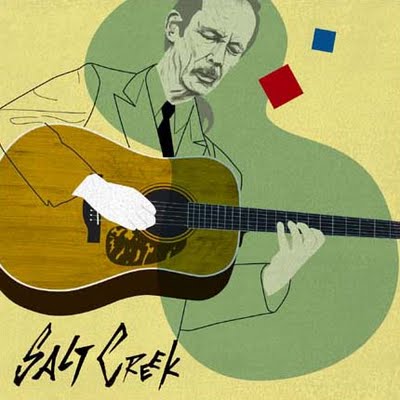Tony Rice, illustrated by Koichi Fujii: ‘He was my hero when I was a teenager over 30 years ago. Now many people have copied his style, but at that time I thought his playing was a mystery, an ability beyond human nature.’ (Koichi Fujii’s portfolio of illustrations is available for viewing and for sale at www.illustrationweb.com.)‘A Mystery, An Ability Beyond Human Nature’
By David McGee
THE BILL MONROE COLLECTION
Tony Rice
RounderReleased in January 2012, Tony Rice’s The Bill Monroe Collection is a bit late in celebrating the Bill Monroe centennial year of 2011, but it can fairly be argued that few artists have celebrated the music of the father of bluegrass longer or better than has Tony Rice. What’s a few months tardiness compared to a stellar career’s worth of Monroe tributes, as this anthology of recordings from the ‘80s and ‘90s attests?
Indeed, Rice emerged as a solo artist and bandleader in the late ‘70s (his self-titled solo debut was released in 1977) after expanding bluegrass’s boundaries as a member of two pioneering progressive outfits, J.D. Crowe and the New South and the David Grisman Quintet. Even at that early stage, Rice was turning heads among his peers with his advanced musicianship (few would dispute his website’s claim that “he is perhaps the greatest innovator in acoustic flatpicked guitar since Clarence White” or that of the illustrator Koichi Fujii, who describes Rice’s playing as “a mystery, an ability beyond human nature”) coupled to a strikingly plaintive tenor voice resonant with a depth of experience well beyond his years, delivered with direct, ringing clarity. Truly an old soul in a young man’s body, Rice has not only set a standard of bluegrass artistry that remains a touchstone for succeeding generations but has done as much as any musician this side of Ricky Skaggs to insure Big Mon’s musical legacy and lifetime achievement remain unassailable.
Tony Rice teams up with Mountain Heart Live at the 2010 August Bluegrass Festival at Granite Hill Campgrounds in Gettysburg, PA, on the Bill Monroe-Lester Flatt classic, ‘Little Cabin Home on the Hill’On this latter count, witness The Bill Monroe Collection representing a couple of decades’ work toiling in Monroe’s pastures of plenty. Give Rounder credit for not pussyfooting around in choosing the repertoire: eight of the 14 tracks are from Rice’s peak moments as a Monroe acolyte and interpreter, meaning the albums he’s cut as a member of the vaunted Bluegrass Album Band, comprised variously of Rice, Doyle Lawson, Vassar Clements, Todd Phillips, Bobby Hicks, J.D. Crowe and Mark Schatz, a tenure chronicled over the course of six albums, including a 1996 anthology of Monroe songs the band cut on its various long players (Lonesome Moonlight: The Songs of Bill Monroe). This is bluegrass at its apex, whether it be of the hard charging variety opening the proceedings (the furious “On My Way Back to the Old Home”); a keening heartbreaker (“Sittin’ Alone In the Moonlight”); a close-harmonized plea for salvation in “River of Death”; or the compelling mix of sadness and joy informing the instrumental “Cheyenne.” Throughout, Hicks’s and Clements’s fiddling, Crowe’s banjo work, Lawson’s energetic mandolin, Phillips’s solid bass and not least of all Rice’s distinctive lead guitar engage in exhilarating dialogues that add worlds of atmosphere to Monroe’s stories, the better to heighten the impact of Rice’s earthy singing.
The Bluegrass Album Band’s version of ‘When You Are Lonely,’ as heard on The Bill Monroe CollectionIn 1990, with a band numbering among its members Bela Fleck, Vassar Clements, and Jerry Douglas, Rice practically invented Americana on his Cold On the Shoulder album. Including the Gordon Lightfoot-penned, title song, Rice took this occasion to bridge folk, country and bluegrass in stirring fashion, covering songs by Bob Dylan (“Fare Thee Well”), Randy Newman (a wistful “I Think It’s Gonna Rain Today,” a version rivaled only by Dusty Springfield’s recording of same) and Rodney Crowell (“Song for The Life”) with authority and sensitivity in what is a truly remarkable display of vocal versatility. Bill Monroe had a place on that album, too, in a frisky version of “Muleskinner Blues” on which it is debatable as to whether the highlight is Rice’s feisty vocal or his muscular flat picking. Losing his voice to dysphonia later that decade was an incalculable blow, to Rice personally and to music in general, but what he could not express vocally he made up for with ever more daring guitar work, exemplified here by his brash soloing on Monroe’s “Gold Rush,” from the Unit of Measure album recorded with the Tony Rice Unit, featuring stirring fiddle work from Rickie Simpkins and a high stepping mandolin break by the redoubtable Jimmy Gaudreau. Reconnecting with Grisman in’87, Rice was among an inter-galactic lineup of all-star players participating in the 1987 double-disc endeavor, Home Is Where the Heart Is, from which this collection draws a straight-ahead reading of Monroe’s classic heartbreaker co-written with Lester Flatt, “Little Cabin Home On the Hill,” served up by Rice with an equanimity through which surfaces both lingering despair and a hope for reconciliation, in a wounded beauty of interpretive singing. Fittingly the album winds down with the cautionary gospel advisory of “You’re Drifting Away,” from The Rice Brothers, Tony’s 1992 album teaming him with his siblings Ron, Larry and Wyatt, all heard here in compelling, restrained close harmony, serving the message to get right with God not as a threat but rather in the measured approach you would adopt with someone in crisis, their friendly persuasion buttressed by the delicate guitar and mandolin solos executed by Tony and Larry, respectively. The family that plays together gets it right in a nice bit of sequencing to close this tribute on a thoughtful note.
Pam Rice with sons Chris (left) and RomanUnfortunately, other Rice family news is deeply saddening. This past August, word came that Tony and wife Pam had lost their son John Christian Scott in an accident; this follows the death of their youngest son, Roman, in 2001. In the wake of this second devastating tragedy, the Rices are requesting that anyone wishing to make donations in memory of their firstborn contribute to the Bluegrass Heritage Foundation’s “Play It Forward!” project (an instrument lending program) by purchasing the DVD Fanning the Fire from the Foundation. As described on Rice’s website, the twenty-minute film (priced at a reasonable $15) chronicles the journey of Lucas White, “a young Texas musician, from his early interest in flatpick guitar at age 12 to his live performances onstage three years later, and features interview and performance clips from award-winning artists such as Dan Tyminski, J.D. Crowe, Rhonda Vincent, and Adam Steffey. In June, the 20-minute film was screened at The Film Festival of Colorado, where it received an award in the Best Documentary (Music/Culture) category.
Trailer for Fanning the FireAs per Rice’s website regarding “Play It Forward!”: ‘Play It Forward!’ promotes music literacy and performance skills by providing deserving youths with no-cost access to primary bluegrass instruments such as mandolins, fiddles, banjos, and guitars. The Bluegrass Heritage Foundation is a 501(c)(3) charity created to preserve and promote the heritage of bluegrass music in America, with a focus on promoting bluegrass in Texas. The Rices hope it will serve as a role model for other states to follow.
"We so admire the Play It Forward! project, Fanning The Fire, and all that is being done by the Bluegrass Heritage Foundation to get instruments into the hands of kids who might not otherwise be given the opportunity, support, and motivation to learn to play them,” said the Rices. "Young Lucas White is dearer to us, especially in our time of loss, than we could ever express in mere words.”
Tony Rice’s The Bill Monroe Collection is available at www.amazon.com
Founder/Publisher/Editor: David McGee
Contributing Editors: Billy Altman, Laura Fissinger, Christopher Hill, Derk Richardson
Logo Design: John Mendelsohn (www.johnmendelsohn.com)
Website Design: Kieran McGee (www.kieranmcgee.com)
Staff Photographers: Audrey Harrod (Louisville, KY; www.flickr.com/audreyharrod), Alicia Zappier (New York)
E-mail: thebluegrassspecial@gmail.com
Mailing Address: David McGee, 201 W. 85 St.—5B, New York, NY 10024




